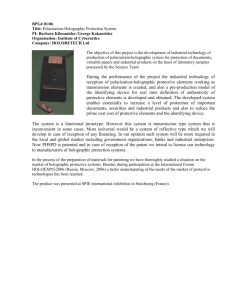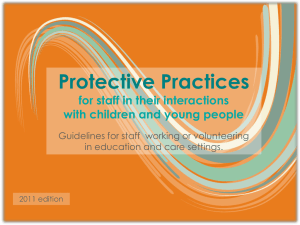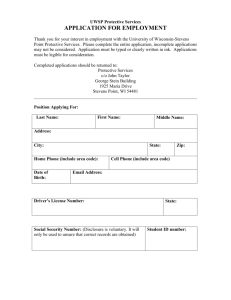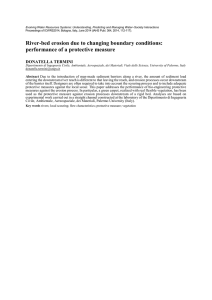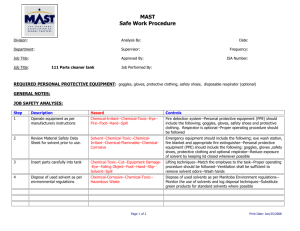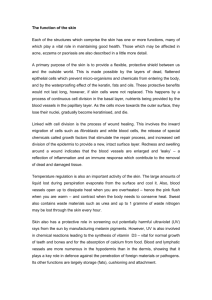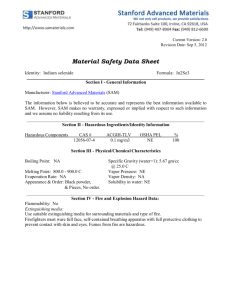THE MINISTRY OF LABOUR -INVALIDS AND SOCIAL AFFAIRS
advertisement
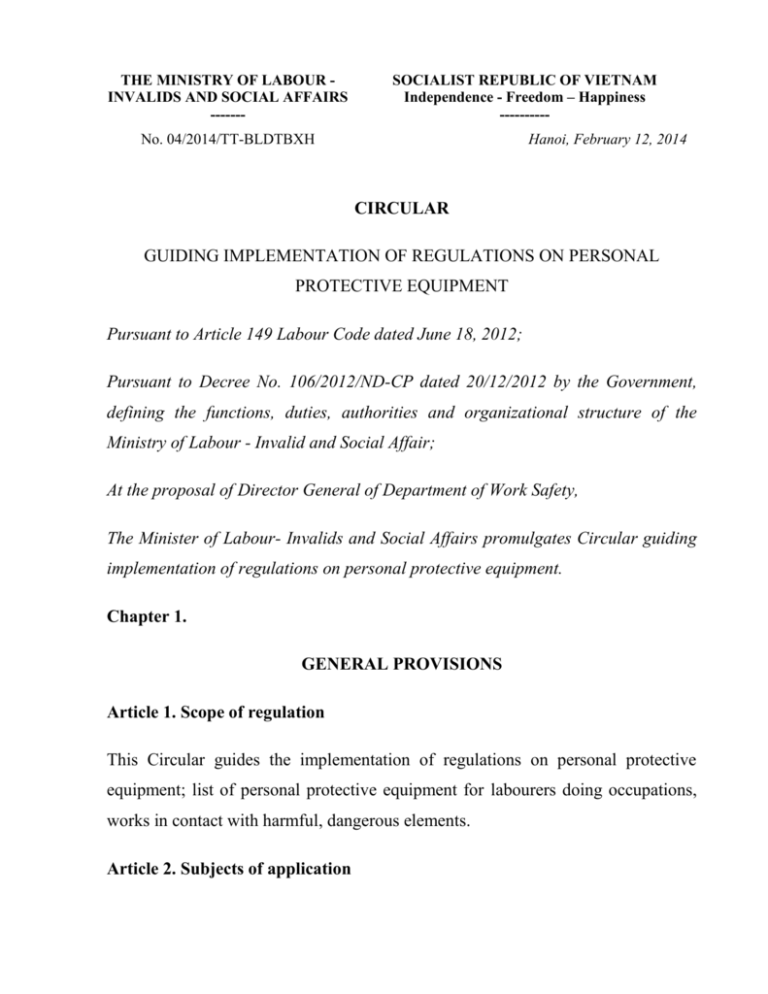
THE MINISTRY OF LABOUR INVALIDS AND SOCIAL AFFAIRS ------- SOCIALIST REPUBLIC OF VIETNAM Independence - Freedom – Happiness ---------- No. 04/2014/TT-BLDTBXH Hanoi, February 12, 2014 CIRCULAR GUIDING IMPLEMENTATION OF REGULATIONS ON PERSONAL PROTECTIVE EQUIPMENT Pursuant to Article 149 Labour Code dated June 18, 2012; Pursuant to Decree No. 106/2012/ND-CP dated 20/12/2012 by the Government, defining the functions, duties, authorities and organizational structure of the Ministry of Labour - Invalid and Social Affair; At the proposal of Director General of Department of Work Safety, The Minister of Labour- Invalids and Social Affairs promulgates Circular guiding implementation of regulations on personal protective equipment. Chapter 1. GENERAL PROVISIONS Article 1. Scope of regulation This Circular guides the implementation of regulations on personal protective equipment; list of personal protective equipment for labourers doing occupations, works in contact with harmful, dangerous elements. Article 2. Subjects of application 1. The employer in enterprises, agencies, organizations, cooperatives; individuals using labourers, including: a) Administrative agencies; State non-business units; armed forces (including forces doing cipher work); b) Political organizations, socio-political organizations, socio-professional organizations, other social organizations; c) Enterprises of all economic sectors; d) Cooperatives; e) Foreign agencies and organizations, international organizations locate head office on territory of the Socialist Republic of Vietnam; f) Other organizations and individuals using labourers. 2. Civil servants, public employees, labourers working in environment with harmful, dangerous elements including managers regularly going for inspection, examination and supervision on the site, research officers, teachers, internships, apprentices or labourers on probationary in enterprises, agencies, cooperatives, organizations and individuals using labourers state at Clause 1 this Article. Article 3. Personal protective equipment 1. Personal protective equipment are necessary tools and means provided to labourer during their work or performing their duties in order to protect bodies from impact of harmful, dangerous elements arising during their work, when dangerous, harmful elements are not be able to eliminated entirely by technological solutions, equipment, technical safety and labour hygiene measures at the working place. 2. Personal protective equipment includes: a) Head protective equipments; b) Eye and face protective equipments; c) Hearing protective equipments; d) Respiratory protective equipments; e) Hand and foot protective equipments; f) Body protective equipments; g) Protective equipments preventing of falling from height; h) Protective equipments preventing of electric shock, electromagnetic field; i) Protective equipments preventing down; k) Other equipments ensuring occupational safety and health. 3. Personal protective equipment provided for employees should be adequate to prevent effectively the impact of harmful, dangerous elements of working environment but convenient and easily for use and maintenance and should not create other harmful elements. 4. Personal protective equipments must satisfy the quality, specification in accordance with regulations, standards and other provisions of the State. Chapter 2. PRINCIPLES FOR PROVISION, USE AND MAINTENANCE OF PERSONAL PROTECTIVE EQUIPMENT Article 4. Conditions for provision of personal protective equipment Labourers who during their work are in contact with one of the following dangerous and harmful elements shall be provided with personal protective equipment: 1. Contact with disadvantageous physical elements; 2. Contact with harmful chemicals and dust; 3. Contact with harmful biological elements and disadvantageous working environment: a) Harmful virus, bacteria (transmittal diseases), harmful insects; b) Polluted dung, water, garbage, sewage; c) Other harmful biological elements; 4. Working with machinery, equipment, working tools, or in positions with high risks of occupational accidents; working in the height place, in mines, low-oxygen places; working on water, in forest or working in other dangerous and harmful working conditions. Article 5. Principles for provision of personal protective equipment 1. The employer shall ensure to carry out technological, equipment, technical safety and occupational hygiene measures to eliminate or to reduce to minimum the damage of dangerous and harmful elements as less as possible and to improve working conditions before providing personal protective equipment. 2. The employer provide personal protective equipment for the employee in accordance with the list in Annex 1 promulgated together with this Circular. In the case of unsafe occupations having dangerous and harmful elements not ensuring health safety for employees are not covered yet in the list of the Ministry of Labour- Invalids and Social Affairs, The employer shall be temporally allowed to provide personal protective equipment to meet the requirements of such occupations, and at the same time the employer shall send reports to the provincial Departments of Labour- Invalids and Social Affairs, of Ministries, sectors directly managing them according to the form in Annex 2 promulgated together with this Circular for supplement to list by the Ministry of Labour- Invalids and Social Affairs. 3. The employer, based on requirements of each job or each occupation in the workplace and taking into account the opinions of trade union at grassroots or representatives of employees collective shall set up a life time of personal protective equipment to fit with nature of work and quality of used personal protective equipment. 4. The employer must make a book of providing and monitoring the personal protective equipment and this book must have signatures of employees received personal protective equipment according to form in Annex 3 promulgated together with this Circular. 5. Employees have right to request The employer for providing new equipment or changing kind of personal protective equipment specified in Annex 1 promulgated together with this Circular to be adequate with actual conditions. The employer shall consult opinions of trade union at grassroots or representatives of employees collective before making decision. 6. Depending on specific requirements, the employer shall provide necessary personal protective equipment for visitors or learners to use during visit and study. 7. All acts by employers to pay cash in hand for employees instead of providing personal protective equipment or to pay cash in hand and let employees to purchase personal protective equipment themselves are strictly prohibited. Article 6. Principles for use of personal protective equipment 1. The employer shall instruct their labourers how to smoothly use the adequate personal protective equipment and closely supervise their use. 2. As for the dedicated personnel protective equipments that require technically high safety, the employer (or persons authorized for provision) shall check to ensure quality, standards of personal protective equipments before distribution to the employee and periodically recheck personal protective equipment during use and make records into a logbook; not using equipment failing to satisfy technical requirements or expired. 3. Employees provided personal protective equipments must use those equipments in accordance with regulations during work. If employees violate regulations, depend on seriousness of violation, they must bear discipline in accordance with labour rules of their establishments or provisions of law. 4. Labourers shall not pay for personal protective equipment. In case personal protective equipment is lost, damaged, or expired, the employer shall provide a substitute. In case of the loss or break- down without legitimate reasons, a labourer shall pay in accordance with labour rules of establishments. When personal protective equipment run out of life time for using or when the employee moves to other occupations, the employee shall return personal protective equipment to the employer if required but they must sign for handing over. Article 7. Principles for maintenance of personal protective equipment 1. The employer shall provide facility for storing and maintaining personal protective equipment according to the instructions of manufactures, or producer of such personal protective equipment. Labourers shall keep the provided personal protective equipment. 2. As for personal protective equipments used in polluted areas vulnerable by toxic substance, bacteria, radiation, after using, the employer shall carry out anticontamination measures, bacteria sterilize, appropriate purging measures to meet the requirements of Hygiene and safety standards for employees, surrounding environment and shall check such equipment periodically. Chapter 3. ORGANIZATION OF IMPLEMENTATION Article 8. Responsibilities of the employer 1. Based on provisions of personal protective equipment promulgated in this Circular and the life time of personal protective equipment already been decided, the employer shall consult opinions of trade union at grassroots or representatives of employees collective to set up an annual plan for purchasing personal protective equipment (including a reserve plan). 2. Expenditures for procuring, providing personal protective equipment shall be accounted into regular expenses for administrative agencies, non-business units, accounted into cost for production and business of the production and business establishments. 3. Periodically, reporting to the provincial Departments of Labour- Invalids and Social Affairs about implementation of personal protective equipment together with implementation of occupational safety and hygiene. Article 9. Responsibilities of the Provincial Department of Labour- Invalids and Social Affairs 1. Assisting People's Committees in provinces and central-affiliated cities to disseminate this Circular to all enterprises, production and business establishments located in their localities; and instructing, urging, examining, inspecting implementation of regulations on personal protective equipment in localities managed by them. 2. Periodically, summing up and reporting to Ministry of Labour- Invalids and Social Affairs about implementation of this Circular together with implementation of occupational safety and hygiene by enterprises, agencies and organizations in their localities. Article 10. Responsibilities of Ministries, Ministerial agencies, Governmental agencies, People’s Committees of provinces and central-affiliated cities Ministries, Ministerial agencies, Governmental agencies, People’s Committees of provinces and central-affiliated cities shall sum up, propose the Ministry of Labour - Invalid and Social Affair to promulgate amendments to list of personal protective equipment for labourers doing occupations, works in contact with harmful, dangerous elements, and guide, direct, urge, check implementation of regulations on personal protective equipment at enterprises, agencies, organizations under their management. Article 11. Effective 1. This Circular takes effect on April 15, 2014. 2. Decision No. 1407/1997/QD-BLDTBXH dated November 14th, 1997 of Minister of Labour- Invalids and Social Affairs on promulgating the personal protective equipment standard for special occupations, works of national serve sector; Circular No. 10/1998/TT-LDTBXH dated May 28th, 1998, of the Ministry of Labour- Invalids and Social Affairs, guiding implementation of regulations on personal protective equipment; Decision No. 68/2008/QD-BLDTBXH dated December 29th, 2008, of Minster of Labour- Invalids and Social Affairs, promulgating list of personal protective equipment for labourers doing occupations, works with harmful, dangerous elements and other documents which are contrary to this Circular cease to be effective on the effective date of this Circular. 3. In the course of implementation, any arising problems should be reported to the Ministry of Labour- Invalids and Social Affairs for study and settlement. PP. THE MINISTER DEPUTY MINISTER Bui Hong Linh * Note: All the forms mentioned in this Circular are not printed herein
